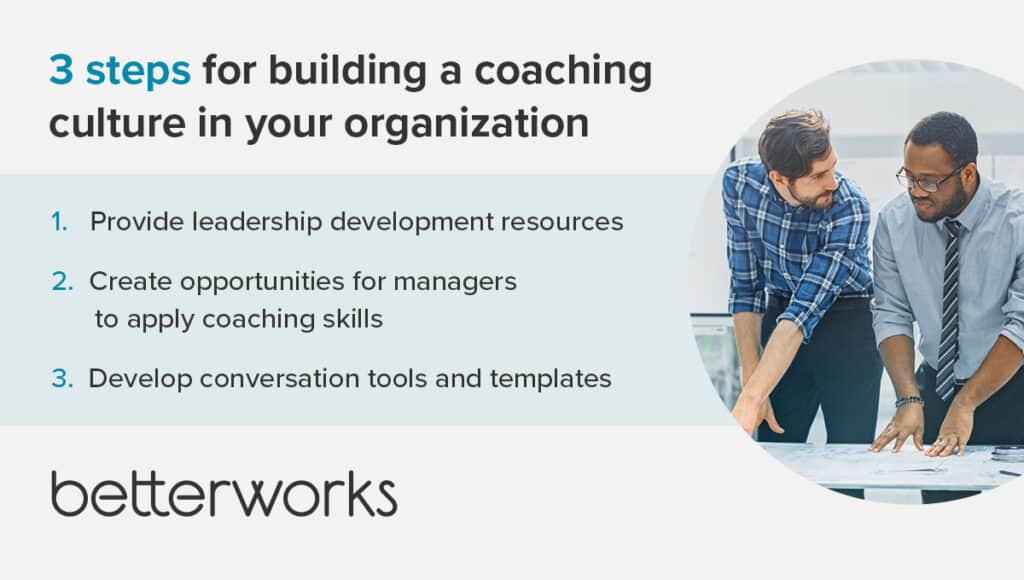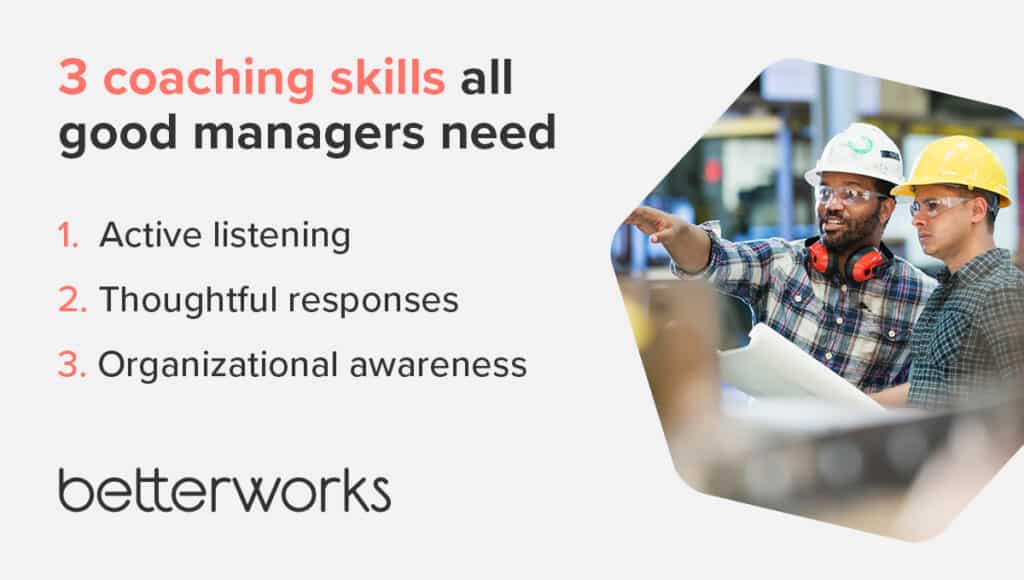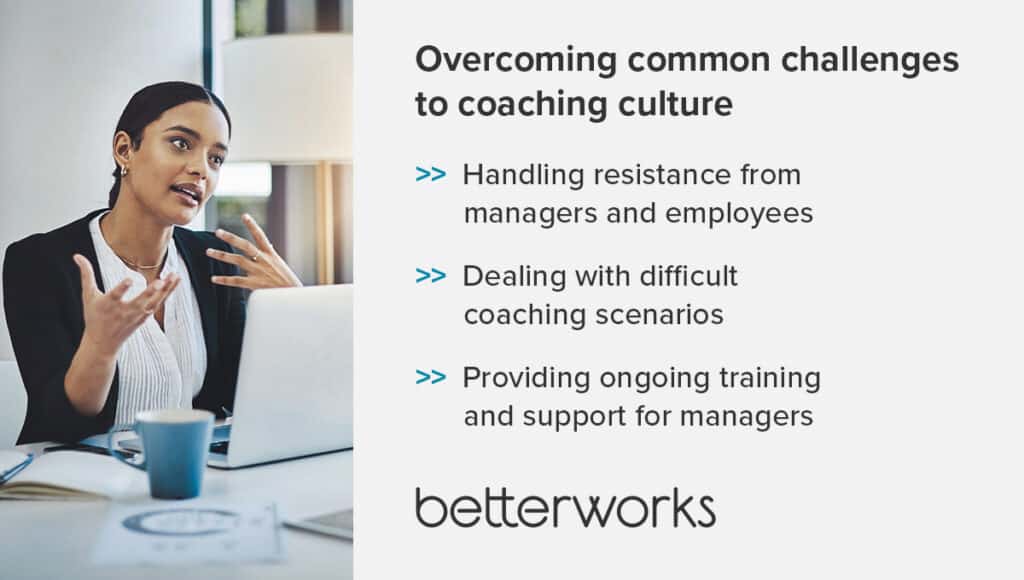Managers increase their impact when they learn how to coach their people, not just oversee them. By providing guidance and support, managers as coaches foster better-performing teams and help their people reach their true potential.
Employees who receive effective managerial coaching report positive outcomes, according to our 2023 State of Performance Enablement report. Among employees who always feel satisfied with manager conversations — in particular, career and development check-ins — 81% are very productive, and 73% always feel engaged. Compare that with employees who are rarely or never satisfied with manager conversations — only 55% are very productive, and only 48% are always engaged. Effective coaching conversations are also more likely to make employees feel valued and report that they enjoy working for their employer.
The evidence shows that coaching produces business results, yet barely half (54%) of managers feel confident in their coaching abilities and less than a quarter feel they get adequate support from HR. The good news is that HR leaders can provide training and foster a coaching culture to help managers take on this vital role. In How to Help Managers Be Better Coaches, which takes a deep dive into why manager effectiveness matters, we share the six key areas where managers say they want help, including coaching for performance, helping employees develop skills and career paths, and giving feedback.
Let’s cover the benefits of coaching and how you can implement coaching conversations in your organization.
Understanding the role of managers as coaches
Shifting managers from their traditional management role to a coaching role empowers them to exert a more positive influence on employee performance. Training managers to serve as coaches and supporting them with the right approaches and resources levels up their impact on employees, and on the business.
Traditional management vs. coaching
Traditional management focuses on setting goals for the team, assigning tasks, and ensuring they’re completed on time and to a certain standard. In this capacity, managers dictate employee priorities and provide task direction, with little wiggle room for employee suggestions or initiative. Traditional management takes a top-down approach, where the manager is in control, and employees are expected to follow their lead.
Coaching instills a more collaborative approach, one where managers help employees grow their capabilities to improve their performance. Coaching is less about giving orders and more about creating a high-performance environment that allows employees to reach their potential, think critically, and develop their skills.
Managers, as coaches, help their reports identify their strengths and weaknesses. They also help employees set objectives based on how their work supports the goals of the team and the business. It’s a bottom-up approach, where the coach acts as a facilitator, and the employee is empowered to make decisions and take ownership of their work.
How coaching creates a positive work environment
Coaching encourages employees to be open and honest about how they’re feeling, where they’re experiencing challenges or roadblocks, and the ideas and solutions they’re thinking about — all without fear of being judged or punished. When team members approach their managers as coaches, they often feel more comfortable taking risks and being creative. Coaching creates a sense of safety because employees know that their voices and opinions are respected and valued.
Coaching also encourages teamwork and collaboration. Effective managers work with their teams to identify their strengths and how they might deliver the most impact on the business. Whether those conversations happen one-on-one or in a group setting, coaching creates conversations where employees are recognized for their qualities and contributions rather than simply critiqued.
How managers as coaches drive business impact
Enabling managers as coaches supports better performance outcomes which, taken together across teams, leads to a high-performance workforce. By providing ongoing guidance and support, coaches help employees identify achievable goals that support the business — and how they’ll reach those goals.
Coaching-centered managers help team members understand their opportunities for internal mobility, whether that’s working on different projects, pursuing promotions, or making lateral moves. Fostering that type of opportunity can encourage employees to grow within the business rather than leave — reducing turnover and keeping important knowledge in-house.
The Betterworks 2023 State of Performance Enablement report showed that employees trust their managers most; yet, almost half said their manager doesn’t figure in their development or is an outright barrier to their careers. Organizations should see this as an opportunity to help managers be a positive force for their employees.
3 steps for building a coaching culture in your organization
Fostering a coaching culture starts with supporting your managers with the right training and resources. However, only 24% of managers feel they’re properly supported by HR, according to our 2023 State of Performance Enablement research.
Here are three ways HR can support managers as they improve their coaching skills and behaviors.
Set the bar on what it means to be a good manager
Explain to your managers what good management looks like in your organization. This will help you set the right benchmarks before training managers for specific skill sets. You can start with the Betterworks BEST framework: Build, Empower, Show, Teach.
Great managers build trust with honest and authentic communication and by supporting employees as they learn and grow. They empower curiosity and provide space for other points of view to encourage problem-solving and critical thinking. Successful managers show humor, humility, candor, and integrity as a way of making connections and building confidence and trust. Lastly, they teach by guiding and listening, and enabling others to problem-solve on their own rather than providing the answers.
Help managers transition to being coaches
Being a manager requires a vastly different skill set than being an individual contributor and most people are not “naturals” at managing, especially when it comes to coaching for development. Understanding how to guide someone through career development requires training and support, which can be taught through courses and workshops. It may also include mentorship programs that pair new managers with tenured managers or leadership, or frequent check-ins. Organizations may want to temporarily reduce managerial responsibilities for first-time leaders so they focus on their people.
Set up infrastructure for goal setting, skills acquisition, and tracking
Offer managers tools and processes for setting and tracking goals around performance and career development for their employees. These include conversation templates to help identify and quantify individual employees’ goals and motivations, recording career aspirations and interests, helping employees identify opportunities for growth and development, and building development goals into a performance plan.
For a comprehensive checklist of actions to help managers coach employees for career growth and development, see 8 Ways to Enable Top-Notch Manager Coaching.

3 coaching skills all good managers need
Great coaches help their team members feel valued and empowered to achieve their goals. What are three of the top skills needed by managers who succeed at coaching?
Active listening
Active listening helps managers better understand their team’s needs. Practiced active listeners engage with others by asking questions, seeking clarity and understanding, and providing feedback. This type of listening helps managers better understand their reports’ thoughts, concerns, and obstacles, allowing them to provide more tailored advice and guidance.
Active listening helps managers discover what someone’s career goals are, for example. When managers ask open-ended questions, listen to what people get excited about, and observe which tasks employees find most engaging, they make better career development suggestions.
Thoughtful responses
Whether a manager is doing a check-in, providing recognition for a job well done, helping with troubleshooting and triage, coaching for development, or conducting a performance review, they should have a clear structure and purpose for each conversation. This will enable both the manager and employee to have a positive experience, a shared understanding, and a road map for moving forward.
Achieving this requires that managers prepare the conversation according to each employee’s needs, communicate intent clearly, prepare an agenda or checklist to guide the conversation, offer context and examples, define expectations, create a space for listening, recommend next steps, document agreed-upon takeaways and actions, track progress, and celebrate success.
Organizational awareness
Organizational awareness helps managers become better coaches because they understand the dynamics of the organization, its goals and objectives, and its structure.
According to Gartner research, the coaching style with the highest impact on employee performance is the “connector.” Managers who adopt this style recognize when to bring in an expert who’s best suited to answer a question or provide guidance. Managers make better connections when they have a deep network, understand the org chart, and recognize workplace culture and dynamics.

Overcoming common challenges when creating a coaching culture
Changing culture isn’t easy. Shifting to a coaching culture entails changing norms and patterns of behavior across the workforce. Here are some common barriers to creating a coaching culture, and steps you can take to overcome them.
Resistance from managers and employees
Resistance to change is natural. Managers might feel that the proposed change puts too much pressure on them. Employees might feel like the change jeopardizes their jobs or doesn’t provide the necessary resources or support. HR’s job is to deliver strong communication about the benefits of switching from a traditional management model to a coaching model, as well as the resources and training that will be provided.
Demonstrate how frequent coaching conversations make the manager’s job easier because it provides an avenue for learning about their teams’ strengths and needs. Meanwhile, help employees understand why a coaching culture gives them more of a say in their work and goals, leading to better performance and development.
Difficult coaching scenarios
Coaching can lead to difficult conversations. An employee could be unwilling to accept constructive feedback, for example, or a team member may struggle to work in a group setting without causing tension and conflict.
Managers need to know how to effectively de-escalate these scenarios and identify what’s most critical to address in the moment. HR can provide resources to help managers de-escalate conflict and engage in diplomatic yet effective conversations.
Providing ongoing training and support for managers
Managers will feel more confident in the shift to coaching if they know they have HR’s support. Make sure managers are aware of the resources available to help them learn and practice their coaching skills.
Modern HR performance management software can make this easier by providing a central place for managers to access data, log coaching conversations, and easily request guidance from other leaders in the organization.

Train managers as coaches to empower future potential
When you embrace the manager as a coach, you can revolutionize the workforce and create lasting performance gains. Strong coaching cultures enjoy better communication, stronger productivity, and the potential for greater retention because they have well-trained managers and motivated teams. Apply the power of coaching to unlock your workforce’s full potential and create a culture of growth and success.
Learn how to develop better managers with employee feedback and prescriptive coaching.
Take a deeper dive on helping managers be better coaches.


